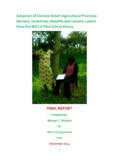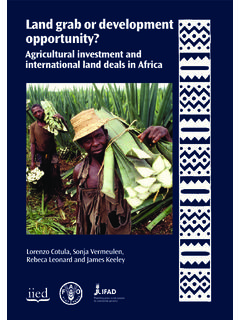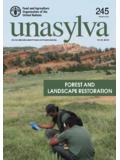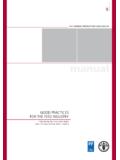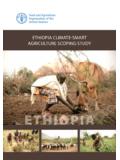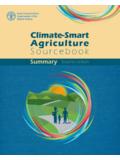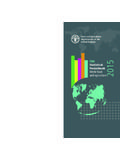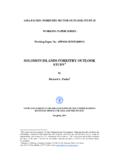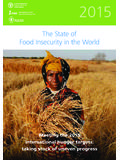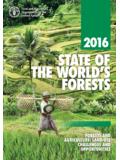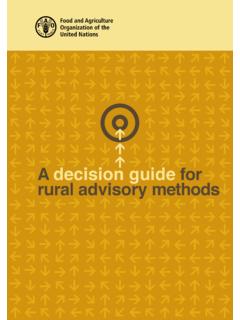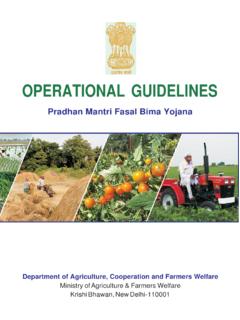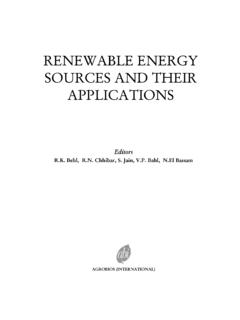Transcription of Solomon Islands and FAO
1 Solomon Islands and FAOP artnering to improve food security and income-earning opportunitiesThe Solomon Islands has partnered with FAO since joining the Organization in 1985. Cooperation has been aimed at enhancing sustainable agriculture and rural development, particularly in view of the island state s largely rural population and its vulnerability to natural disasters and climate change. Assistance has focused on building the evidence base for policy-makers and supporting local food production. FAO s presence in the Solomon Islands was strengthened with the establishment of a country office in Hibi FAO Representative to the Solomon Islands and Subregional Coordinator for the Pacific IslandFAO Subregional Office for the Pacific Islands Apia, SamoaTel: +685 22127 E-mail: local rice production for food security The Solomon Islands are heavily dependent on food imports and are affected by rising food prices.
2 The 2008 food price shock was particularly marked for rice prices, the retail prices of which doubled in urban areas and rose even more in rural areas. As one of the highest per capita consumers of rice in the Pacific (100 kg per person per year), major importance is given to increasing domestic rice production. With its very fertile soils, abundant rainfall and sunshine, many rice specialists agree that local rice production can be developed successfully in the achievements have been made through a policy adopted by the National Coalition for Reform and Advancement supporting the country s rural rice development programme.
3 The policy covers smallholder as well as commercial rice has provided technical assistance to support sustainable rice production, strengthening production capacities and technologies. Nineteen extension staff from eight provinces have been trained and five farmer field schools have been established. Under an innovative extension model applied for the first time in the country, around 200 farmers have been trained in integrated rice-crop SCOPE COUNTRY FOCUS Strategic direction for FAO assistance to the Solomon Islands is provided by the 2013-2017 Country Programming Framework (CPF) for the Pacific Subregion, which balances regional-level initiatives with demand-driven country-specific plans for 14 Pacific Island Countries.
4 Across the region, assistance is centred on five priority areas: Improved policy plans and legislation Enhancement of ecologically sustainable agricultural production (including forestry and fisheries) Improved food quality and safety Improved production, processing and marketing of agricultural produce Protection and sustainable use of biodiversityAligning FAO s expertise to Solomon Islands development prioritiesFurther to the above region-wide priorities, FAO assistance at the country level reflects relevant priorities in key national development policies, including the Solomon Islands National Development Strategy 2011-2020 and the Agriculture and Rural Development , the dual focus of FAO s 2013-2017 Country Programming Framework (CPF) in the Solomon Islands is on.
5 Food and nutrition security, including resilience to impacts of disasters Climate change, and environmental management and resilience8/2016 Partnering for regional food security FAO and the Secretariat of the Pacific Community (SPC) have teamed up to establish a regional Food Security Information System. Covering the collection and storage of baseline data for six critical food security indicators, the system represents a major step forward for all Pacific Island Countries, including the Solomon Islands . This collaborative initiative has laid the basis for further national capacity-building activities to be implemented over the next two preparedness and responseThe Solomon Islands , like all Pacific Island Countries, is extremely vulnerable to natural disasters and the effects of climate change, which threaten food security and livelihoods.
6 Following its revitalization under FAO s leadership, the Pacific Regional Food Security Cluster (part of the Pacific Humanitarian Team) is now an active information-sharing forum for stakeholders engaged in food provided emergency response support to the Solomon Islands following severe flooding which affected the country in 2014. FAO personnel were deployed to support the government-led Food Security and Livelihoods Cluster, providing technical assistance for needs assessments and response design and strategy. They also worked with the Government on the formulation of donor the 2015-2016 El Ni o event, FAO has supported the Solomon Islands Government to monitor and assess the effects of drought on food security and crop production.
7 To this end, survey teams were deployed to those households at highest risk, and additional trips are planned to establish trends and identify vulnerable areas and agricultural subsectors. FAO is working closely with the Ministry of Agriculture and Livestock to strengthen their capacity in data collection, thus enabling them to respond to slow-onset disasters. Strengthening national capacity for food control Food safety plays a significant role in the Solomon Islands , leading to health outcomes as well as economic and agricultural development. FAO is working with Ministry of Health officials to strengthen food control systems and assist in ensuring imported food is safe, through the provision of technical advice and training of inspectors on food safety control.
8 Imported food control guidelines and inspection procedures for food control systems at the entry point are also developed. Street food hygiene is an additional key area where food safety is being strengthened with the development of a training manual and training on hygienic preparation of street food delivered to food vendors. Building the agricultural evidence base Effective monitoring and analysis of data on critical aspects of food security and nutrition is crucial for informed decision-making and policy development. In order to fill the gap in reliable data on agricultural production, particularly smallholder production, a key area of cooperation with the Solomon Islands is in data collection and analysis.
9 FAO has provided direct technical assistance through a number of activities in this area. At the farm levelThe Government has recognized that improving traditional farming systems must be a major priority if resource productivity, food production and food security are to be increased. As part of a comprehensive analysis of the island country s farming systems, FAO has documented the crop budgets of 16 farmer enterprises and provided technical assistance through capacity building. As a result, extension, research and advisory staff from government and non-governmental organizations as well as selected host farmers have gained knowledge and experience in conducting, monitoring and evaluating on-farm evaluation part of the project activities, farm management tools such as simple record keeping techniques and basic enterprise profitability analysis were adopted, and a reference manual was developed and applied during training courses.
10 This was the first time that participatory on-farm evaluation trials were conducted in the country, and activities included guidance on the application of participatory rural appraisals and the utilization of farm record the national levelIn 2010, FAO conducted a scoping study on agricultural data to assess national capacities for the collection, reporting and use of data to monitor trends in agricultural production. Results of the study were also used to define the role of the domestic agriculture sector in mitigating external shocks and maintaining food security across the study concluded that, although commodity trade statistics were reported regularly, statistics on agricultural production were very limited, as no national agricultural survey or census had been carried out in more than 20 years.
